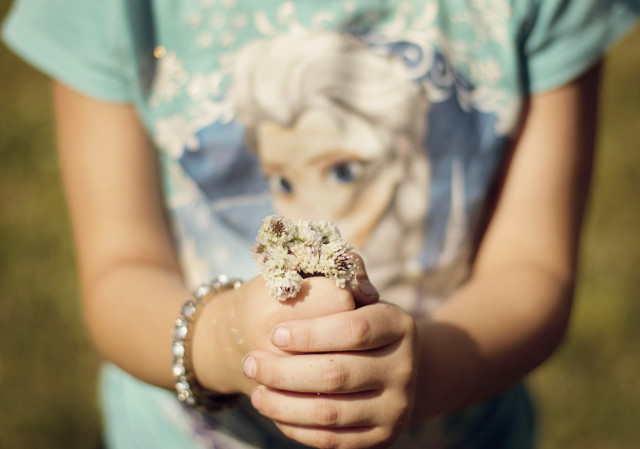There I was, sitting at my son’s baseball game, watching my 7-year-old daughter dig through the grass with purpose. She was picking through small white flowers, her face inches from the ground, inspecting each one carefully, crawling, digging and leaving behind any that were not the exact shade she had set her mind on. This process comforted her, serving as a distraction from the noise of the game and the constant, yet unpredictable, screams from the crowd. I looked from side to side to see who was watching. How long would it be before someone pointed out her odd behaviors?
“Chloe, get up please.”
No answer. She was too deep within her own self-protection. But instead of seeing this as a strength, I slid down in my seat and gave into my own weaknesses, reaching for my phone to distract myself.
I thumbed through Facebook, not really reading anything in particular. The faster she dug through the grass, the faster I thumbed my screen, mimicking her panicked motion. What was easing her fear was feeding into mine, and just as I caught myself brimming with anxiety, a title on my news feed caught my attention: “Autistic Kids Need to be Able to Talk About Disability.” I stared at it for a few moments, indecisive if I needed to open it. I mean, as her parent, her well-educated parent, I knew all about this, right? Her father is a public school teacher. I have college education in psychology. Clearly we allowed her to talk about her autism. Squeamishly slouching in my chair, hiding while my daughter quietly comforted herself, I realized, maybe not.
Two paragraphs in and I know I’m in trouble. I have already begun analyzing all of my interactions with my child, and I am failing miserably by my own interpretation. In all of my attempts to try to teach her to not self-pity or use her autism as an excuse, I had avoided the topic of autism being a disability at all, reducing it to a brain that just “thinks a little differently.” The question was, why? The answer was going to take a lot more soul searching to figure out.
Our family is no stranger to disability. With two other children with a neuromuscular disease that limits their organ functions and often times mobility, we are well versed to the wheelchair “stares” and the leg brace questions, and we are perfectly comfortable hanging our little blue wheelchair friend from the van mirror. But why is it so different for me to refer to our daughter’s autism as a disability, and why had I not even thought of it until now?
I continue to read as Chloe continues to search for her perfect little white flowers. When I reach a list of things that parents need to help their children with autism understand about themselves, my stomach begins to churn. Unfortunately, it was much more than indigestion from the nachos from the concession stand. It finally comes flooding in that while I knew all of these things about autism, I truly have not accepted that any of them belong to my daughter. How could it be that all of those years ago I was not shocked by her diagnoses, but still have not come to accept it? How could I defend her diagnosis to others, but still not believe it myself? How could I treat her autism like something we needed to overcome, instead of teaching her to accept her autism as a disability and embrace the life she was given? It was not a good feeling, but served as a much-needed wake-up call.
I slipped my phone back into my pocket and sat back up straight. I laid my eyes back on my little girl, for the first time in a long time seeing her. I wanted to scoop her up and hold her tight. But I knew that wasn’t what she needed. It was what I needed. That was the first thing that needed to change in our relationship. We were going to hit the reset button right there and then, and it was going to start with me. I closed my eyes and took a deep breath, releasing as much guilt as I possibly could, knowing that harboring it was not going to do us any good. When I opened my eyes she was standing before me, a fist full of white flowers, waiting for me to take them.
“For you, Mommy.”
My eyes welled up with tears. How many other things had I ruined by not being able to accept her autism? To think, something I so passionately wanted to stop, thought I needed to stop, became something so beautiful.
A version of this post originally appeared on What Do You Do, Dear?
The Mighty is asking its readers the following: Describe the moment someone changed the way you think about disability and/or illness. If you’d like to participate, please send a blog post to community@themighty.com. Please include a photo for the piece, a photo of yourself and 1-2 sentence bio.
Want to end the stigma around disability? Like us on Facebook.
And sign up for what we hope will be your favorite thing to read at night.


